When Devo Emerged as ‘New Traditionalists’
Bolstered by the hit, "Whip It," Devo struck platinum in 1980 with their third album, Freedom of Choice. They followed it up on Aug. 26, 1981 with New Traditionalists, whose ironic title was inspired by something they had seen while touring the Far East.
"We had just come back from Japan, and we'd come across this ultra-right-wing group there called the New Traditionalists," bassist Gerald Casale told Seattle Weekly in 2012, "and they sold pins in stores. Satirically, we bought a couple of those pins. As we were writing those songs, we just decided to graft the Japanese right-wing name onto those records. We became the New Traditionalists, but turned it on its ear. We appropriated the idea of that, meaning we were going to provide you with new traditions to forget about the old ones."
Having struck upon a successful, chart-conquering formula, Devo seemed less inclined to make drastic changes to their sound, never mind retreat to the artsy experiments and obscure lyrical concepts of their first pair of albums. Instead, chief songwriters Mark Mothersbaugh and Casale moved ahead with their self-proclaimed de-evolutionary creative process by swapping ever more guitar parts for synthesizers and even adding some programmed drums into telltale cuts like "Jerkin' Back 'n' Forth" and one of the all-time nerd anthems "Through Being Cool."
At the same time, Devo's brain trust couldn't help but install increasingly sardonic or outright pessimistic lyrics into infectious cuts like "Love Without Anger," "Race of Doom" and "Beautiful World" -- as though they were subconsciously chafing against their sudden hit-maker status by preaching ever darker themes within them. And in the closing "Enough Said," Devo commented quite clearly on ruthless politicians in a way that still resonates today: "Take all the leaders from around the world / Put them together in a great big ring / Televise it as the lowest show on earth / And let them fight like hell to see who's king."
None of which stopped New Traditionalists from performing exceedingly well at retail, radio and MTV, albeit not quite on par with the previous year's monster hit. It helped augur Devo's swift sales decline in the next few years, even though their incisive musical observations about humanity's intellectual de-evolution were being proved increasingly prophetic.
25 Bands You Won't Believe Aren't in the Rock and Roll Hall of Fame Yet
More From Diffuser.fm









